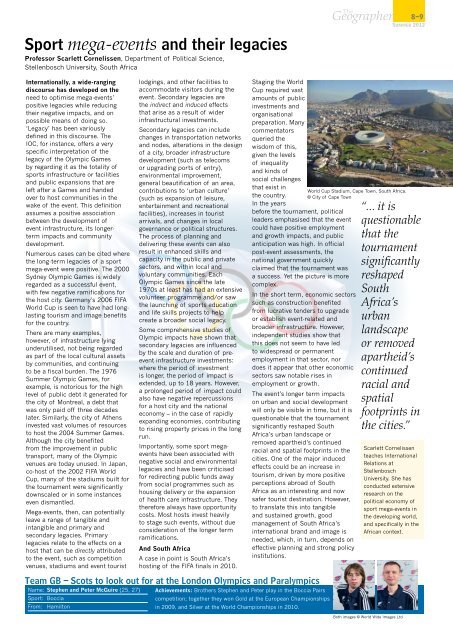Summer - Royal Scottish Geographical Society
Summer - Royal Scottish Geographical Society
Summer - Royal Scottish Geographical Society
Create successful ePaper yourself
Turn your PDF publications into a flip-book with our unique Google optimized e-Paper software.
Sport mega-events and their legacies<br />
Professor Scarlett Cornelissen, Department of Political Science,<br />
Stellenbosch University, South Africa<br />
The<br />
Geographer 8-9<br />
<strong>Summer</strong> 2012<br />
Internationally, a wide-ranging<br />
discourse has developed on the<br />
need to optimise mega-events’<br />
positive legacies while reducing<br />
their negative impacts, and on<br />
possible means of doing so.<br />
‘Legacy’ has been variously<br />
defined in this discourse. The<br />
IOC, for instance, offers a very<br />
specific interpretation of the<br />
legacy of the Olympic Games<br />
by regarding it as the totality of<br />
sports infrastructure or facilities<br />
and public expansions that are<br />
left after a Games and handed<br />
over to host communities in the<br />
wake of the event. This definition<br />
assumes a positive association<br />
between the development of<br />
event infrastructure, its longerterm<br />
impacts and community<br />
development.<br />
Numerous cases can be cited where<br />
the long-term legacies of a sport<br />
mega-event were positive. The 2000<br />
Sydney Olympic Games is widely<br />
regarded as a successful event,<br />
with few negative ramifications for<br />
the host city. Germany’s 2006 FIFA<br />
World Cup is seen to have had longlasting<br />
tourism and image benefits<br />
for the country.<br />
There are many examples,<br />
however, of infrastructure lying<br />
underutilised, not being regarded<br />
as part of the local cultural assets<br />
by communities, and continuing<br />
to be a fiscal burden. The 1976<br />
<strong>Summer</strong> Olympic Games, for<br />
example, is notorious for the high<br />
level of public debt it generated for<br />
the city of Montreal, a debt that<br />
was only paid off three decades<br />
later. Similarly, the city of Athens<br />
invested vast volumes of resources<br />
to host the 2004 <strong>Summer</strong> Games.<br />
Although the city benefited<br />
from the improvement in public<br />
transport, many of the Olympic<br />
venues are today unused. In Japan,<br />
co-host of the 2002 FIFA World<br />
Cup, many of the stadiums built for<br />
the tournament were significantly<br />
downscaled or in some instances<br />
even dismantled.<br />
Mega-events, then, can potentially<br />
leave a range of tangible and<br />
intangible and primary and<br />
secondary legacies. Primary<br />
legacies relate to the effects on a<br />
host that can be directly attributed<br />
to the event, such as competition<br />
venues, stadiums and event tourist<br />
lodgings, and other facilities to<br />
accommodate visitors during the<br />
event. Secondary legacies are<br />
the indirect and induced effects<br />
that arise as a result of wider<br />
infrastructural investments.<br />
Secondary legacies can include<br />
changes in transportation networks<br />
and nodes, alterations in the design<br />
of a city, broader infrastructure<br />
development (such as telecoms<br />
or upgrading ports of entry),<br />
environmental improvement,<br />
general beautification of an area,<br />
contributions to ‘urban culture’<br />
(such as expansion of leisure,<br />
entertainment and recreational<br />
facilities), increases in tourist<br />
arrivals, and changes in local<br />
governance or political structures.<br />
The process of planning and<br />
delivering these events can also<br />
result in enhanced skills and<br />
capacity in the public and private<br />
sectors, and within local and<br />
voluntary communities. Each<br />
Olympic Games since the late<br />
1970s at least has had an extensive<br />
volunteer programme and/or saw<br />
the launching of sports education<br />
and life skills projects to help<br />
create a broader social legacy.<br />
Some comprehensive studies of<br />
Olympic impacts have shown that<br />
secondary legacies are influenced<br />
by the scale and duration of preevent<br />
infrastructure investments:<br />
where the period of investment<br />
is longer, the period of impact is<br />
extended, up to 18 years. However,<br />
a prolonged period of impact could<br />
also have negative repercussions<br />
for a host city and the national<br />
economy – in the case of rapidly<br />
expanding economies, contributing<br />
to rising property prices in the long<br />
run.<br />
Importantly, some sport megaevents<br />
have been associated with<br />
negative social and environmental<br />
legacies and have been criticised<br />
for redirecting public funds away<br />
from social programmes such as<br />
housing delivery or the expansion<br />
of health care infrastructure. They<br />
therefore always have opportunity<br />
costs. Most hosts invest heavily<br />
to stage such events, without due<br />
consideration of the longer term<br />
ramifications.<br />
And South Africa<br />
A case in point is South Africa’s<br />
hosting of the FIFA finals in 2010.<br />
Staging the World<br />
Cup required vast<br />
amounts of public<br />
investments and<br />
organisational<br />
preparation. Many<br />
commentators<br />
queried the<br />
wisdom of this,<br />
given the levels<br />
of inequality<br />
and kinds of<br />
social challenges<br />
that exist in<br />
the country.<br />
In the years<br />
before the tournament, political<br />
World Cup Stadium, Cape Town, South Africa.<br />
© City of Cape Town<br />
leaders emphasised that the event<br />
could have positive employment<br />
and growth impacts, and public<br />
anticipation was high. In official<br />
post-event assessments, the<br />
national government quickly<br />
claimed that the tournament was<br />
a success. Yet the picture is more<br />
complex.<br />
In the short term, economic sectors<br />
such as construction benefited<br />
from lucrative tenders to upgrade<br />
or establish event-related and<br />
broader infrastructure. However,<br />
independent studies show that<br />
this does not seem to have led<br />
to widespread or permanent<br />
employment in that sector, nor<br />
does it appear that other economic<br />
sectors saw notable rises in<br />
employment or growth.<br />
The event’s longer term impacts<br />
on urban and social development<br />
will only be visible in time, but it is<br />
questionable that the tournament<br />
significantly reshaped South<br />
Africa’s urban landscape or<br />
removed apartheid’s continued<br />
racial and spatial footprints in the<br />
cities. One of the major induced<br />
effects could be an increase in<br />
tourism, driven by more positive<br />
perceptions abroad of South<br />
Africa as an interesting and now<br />
safer tourist destination. However,<br />
to translate this into tangible<br />
and sustained growth, good<br />
management of South Africa’s<br />
international brand and image is<br />
needed, which, in turn, depends on<br />
effective planning and strong policy<br />
institutions.<br />
Team GB – Scots to look out for at the London Olympics and Paralympics<br />
Name: Stephen and Peter McGuire (25, 27)<br />
Sport: Boccia<br />
From: Hamilton<br />
Achievements: Brothers Stephen and Peter play in the Boccia Pairs<br />
competition; together they won Gold at the European Championships<br />
in 2009, and Silver at the World Championships in 2010.<br />
“... it is<br />
questionable<br />
that the<br />
tournament<br />
significantly<br />
reshaped<br />
South<br />
Africa’s<br />
urban<br />
landscape<br />
or removed<br />
apartheid’s<br />
continued<br />
racial and<br />
spatial<br />
footprints in<br />
the cities.”<br />
Scarlett Cornelissen<br />
teaches International<br />
Relations at<br />
Stellenbosch<br />
University. She has<br />
conducted extensive<br />
research on the<br />
political economy of<br />
sport mega-events in<br />
the developing world,<br />
and specifically in the<br />
African context.<br />
Both images © World Wide Images Ltd








